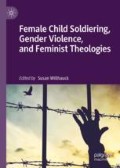Abstract
This chapter theo-ethically contemplates the soldiering of girls in colonial Korea by examining Japan’s mobilization of girls during its Asia Pacific War (1931–1945). More specifically, soldiering girls in Korea is argued as the manifestation of the idea of sovereignty’s right to kill (e.g., necropolitics). Through the lens of “necropolitical labor,” which means that the extraction of labor from those who are condemned to death happens for the fostering of lives of others (i.e., state), the soldiering of girls in the late colonial Korean context reveals the militarized incorporation of girls into the body of the nation. The chapter will further generate a Christian feminist ethic of peace that is strong enough to stop the nation-state from exercising its right to kill the vulnerable for the fostering of the lives of others.
Access this chapter
Tax calculation will be finalised at checkout
Purchases are for personal use only
Notes
- 1.
“A Letter from an Elderly Survivor of Korean Women’s Volunteer Labor Corps,” Hangyeore News Paper 4/7/2017, http://www.hani.co.kr/arti/society/area/789752.html.
- 2.
BBC News, 11/29/2018, Mitsubishi Heavy Ordered Forced S. Korean War Workers https://www.bbc.com/news/business-46381207.
References
Alexander, M. Jacqui. 2005. Pedagogies of Crossing: Meditations on Feminism, Sexual Politics, Memory, and the Sacred. Durham, NC: Duke University Press.
Butler, Smedley. 2004. War Is a Racket. Edited by Dragan Nikolic. New York: Aristeus Books.
Coulter, Chris. 2009. Bush Wives and Girl Soldiers: Women’s Lives through War and Peace in Sierra Leon. Ithaca, NY: Cornell University Press.
Fanon, Frantz. 2004. The Wretched of the Earth. Translated by Richard Philcox. New York: Grove Press.
Kim, Janice. 2007. The Pacific War and Working Women in Late Colonial Korea. Signs 33 (1): 81–103.
———. 2009. To Live to Work: Factory Women in Colonial Korea, 1910–1945. Palo Alto, CA: Stanford University Press.
Lee, Jin-Kyung. 2010. Service Economies: Militarism, Sex Work, and Migrant Labor in South Korea. Minneapolis: University of Minnesota Press.
Mbembe, Achille. 2003. “Necropolitics.” Translated by Libby Meintjes. Public Culture 15 (1): 11–40.
Moon, Seungsook. 2010. Regulating Desire, Managing the Empire: U.S. Military Prostitution in South Korea, 1945–1970. In Over There: Living with the U.S. Military Empire from World War to the Present, ed. Maria Hoehn and Seungsook Moon, 39–77. Durham, NC: Duke University Press.
Naitou, Hisako. 2005. Korean Forced Labor in Japan’s Wartime Empire. In Asian Labor in the Wartime Japanese Empire: Unknown Histories, ed. Paul H. Kratoska, 90–98. New York: An East Gate Book.
Park, Soon-Won. 2007. The Politics of Remembrance: The Case of Korean Forced Laborers in the Second World War. In Rethinking Historical Injustice and Reconciliation in Northeast Asia: The Korean Experience, ed. Gi-Wook Shin, Soon-Won Park, and Daqing Yang, 55–74. New York: Routledge.
Soh, Sarah. 2008. The Comfort Women: Sexual Violence and Postcolonial Memory in Korea and Japan. Chicago: The University of Chicago Press.
Steinl, Leonie. 2017. Child Soldiers as Agents of War and Peace: A Restorative Transitional Justice Approach to Accountability for Crimes under International Law. Hague, Netherlands: Asser Press.
Tanaka, Yuki. 2002. Japan’s Comfort Women: Sexual Slavery and Prostitution during World War II and the U.S. Occupation. New York: Routledge.
Author information
Authors and Affiliations
Corresponding author
Editor information
Editors and Affiliations
Rights and permissions
Copyright information
© 2019 The Author(s)
About this chapter
Cite this chapter
Pae, KJ.C. (2019). Factory Girls and ‘Comfort’ Girls: A Feminist Theo-Ethical Reflection on Korean Girl Soldiers in Japanese Empire. In: Willhauck, S. (eds) Female Child Soldiering, Gender Violence, and Feminist Theologies. Palgrave Macmillan, Cham. https://doi.org/10.1007/978-3-030-21982-6_8
Download citation
DOI: https://doi.org/10.1007/978-3-030-21982-6_8
Published:
Publisher Name: Palgrave Macmillan, Cham
Print ISBN: 978-3-030-21981-9
Online ISBN: 978-3-030-21982-6
eBook Packages: Religion and PhilosophyPhilosophy and Religion (R0)

